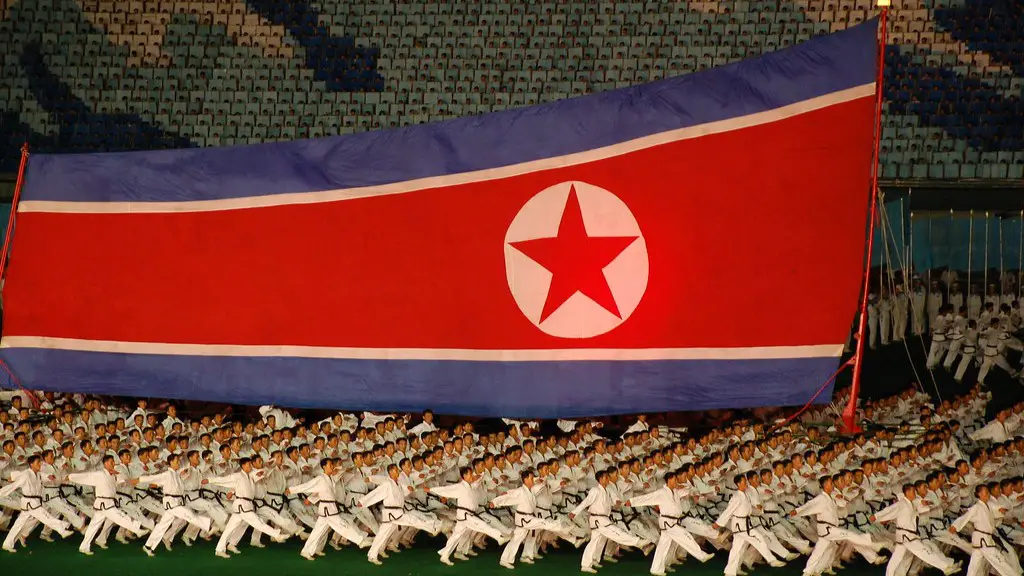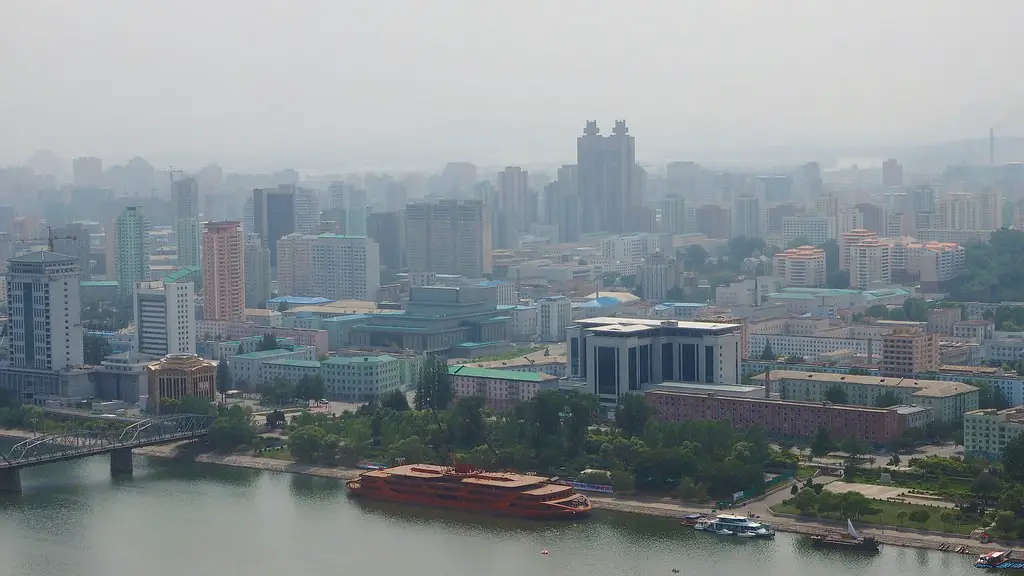The United States is firmly committed to standing against North Korea and seeks to de-escalate the tensions with this belligerent state. North Korea, however, has been increasingly provocative, including continued efforts to expand their nuclear weapons and advances in their ballistic missile capabilities. In response, the United States has increased diplomatic and economic sanctions and deployed military assets to the region.
The Trump Administration has become increasingly aggressive in its approach to North Korea. In August 2017, the United Nations Security Council unanimously passed a new sanctions package against North Korea. This package is the largest yet, and while it is unlikely to achieve the desired result of complete denuclearization, it is intended to pressure the country to change its policies.
The United States has also been vocal in its support of South Korean President Moon Jae-in’s more conciliatory approach to North Korea. While Moon has made progress in reducing inter-Korean tensions, the United States has been clear that it will not accept a freeze on North Korea’s nuclear program without full denuclearization. In addition, the United States has deployed its THAAD anti-missile defense system in South Korea in a show of solidarity against Pyongyang.
Despite the tough rhetoric and increased economic sanctions, the United States remains committed to a diplomatic approach to solving the North Korean crisis. The United States has led several multilateral efforts to secure a peaceful resolution to the crisis, including the Six-Party Talks and the denuclearization negotiations between the United States and North Korea in 2018. These efforts have been unsuccessful, but it remains the official policy of the United States that denuclearization is the only acceptable outcome to the conflict.
The United States has also implemented a “maximum pressure campaign” against North Korea, which includes the use of sanctions, diplomatic isolation, and cyber sabotage. It is unclear whether this strategy will be effective in changing North Korea’s behavior. North Korea is well-known for its ability to survive extreme hardship and has proven itself resilient even when under the most severe sanctions. Nonetheless, the United States continues to use multiple strategies, both diplomatic and military, in an effort to prevent the North Korean regime from attaining its nuclear ambitions.
Role of China in US-North Korea Relations
China has long been a key ally of North Korea, providing it with vital economic and diplomatic support. China has been critical to the US’ efforts to defuse the situation in the Korean Peninsula and has been involved in several negotiations and diplomatic initiatives. China has also taken a tough stance on North Korea, imposing United Nations sanctions and tightly controlling the flow of goods and currency across their shared border.
Despite China’s efforts, the US has repeatedly expressed its frustration with China’s failure to rein-in North Korea. In particular, the US has accused China of failing to properly enforce existing UN sanctions, as well as providing financial support for North Korea’s nuclear and missile programs. The US has also accused China of being complicit in North Korea’s human rights abuses and has pressed China to use its influence over North Korea to secure a peaceful resolution of the crisis.
Despite the tension between the US and China over North Korea, China is viewed by many as the key to a successful resolution of the crisis. China is expected to use its close ties to North Korea to push for a diplomatic solution, as well as its economic leverage over Pyongyang to enforce sanctions and constrain the regime’s activities.
Seeing Oppurtunities Instead Of Threats
In recent years, US policy towards North Korea has shifted, increasingly looking to see the opportunities instead of only the threats. The US is now looking to enlist regional partners and allies to increase pressure on Pyongyang and ideally use it to open up the door to negotiations. South Korea has been playing a crucial role in this approach, as have Japan and other regional nations.
The US has also been engaging with North Korean citizens in an attempt to foster dialogue, bridge the gap between North Koreans and the outside world and use it as leverage against North Korea’s government. The US has bolstered support for non-government organizations, provided assistance to North Korean defectors and implemented a variety of cultural exchange programs.
At the same time, the US has been adamant that North Korea must be held accountable for its human rights abuses and has continued to impose sanctions on North Korea for its continued development of nuclear weapons and missile systems. The US has also maintained that Pyongyang must take concrete steps towards denuclearization if any meaningful negotiations are going to take place.
Implications of US-North Korea Relations
US-North Korea relations have had far-reaching geopolitical implications. These implications have been felt around the world, as the conflict between the US and North Korea has dramatically shifted the balance of power in the region. In addition, the economic sanctions have had a far-reaching economic impact, with countries such as China, Russia and South Korea heavily impacted by the sanctions and the disruption caused by the US-North Korea tensions.
The conflict between the US and North Korea has also had an impact on its immediate neighbors. The tension between the two countries has been felt in Japan, South Korea and other countries in the region, with many of these countries increasing their military capabilities in response to North Korea’s escalating nuclear and ballistic missile programs.
Furthermore, the conflict has also had serious implications for global security and stability, as the risk of a nuclear conflict is now being taken more seriously than ever before. If the US and North Korea are unable to reach a peaceful resolution, the risk of a nuclear conflict and the potential devastation it could cause to the region is a real and worrying prospect.
The International Community’s Efforts Against North Korea
In the face of rising tensions, the international community has taken a number of steps to address the North Korean crisis. The United Nations has passed a number of resolutions condemning North Korea’s nuclear weapons program and its human rights abuses. In addition, many nations, including the US, have increased their economic sanctions against North Korea in an effort to force Pyongyang to change its policies.
In addition to diplomatic and economic sanctions, the US and its regional allies have also taken a number of military steps to contain North Korea’s belligerence. The US has deployed its THAAD missile defense system in South Korea, increased its presence in the region and bolstered the defenses of its regional allies.
The international community has also been actively engaged in dialogues with North Korea in an effort to find a peaceful resolution to the crisis. In 2018, the US and North Korea engaged in a series of bilateral negotiations, though these have failed to produce any results. The US has also been involved in multilateral and regional efforts, including the Six-Party Talks.
The international community has also attempted to mobilize North Korea’s citizens in its efforts to counter Pyongyang’s regime. The US and its allies have provided aid and assistance to North Korean defectors and sought to expose the regime’s human rights abuses in an effort to strengthen the opposition to the regime.
US-North Korea Relations in the Future
It remains to be seen how the US-North Korea conflict will evolve in the future. North Korea has shown no signs of curtailing its nuclear and missile programs and continues to be a serious threat to regional and global stability. The US has adopted an increasingly tough stance towards North Korea and is determined to prevent it from attaining its nuclear ambitions.
Despite the tough rhetoric and political posturing, the US has maintained that a diplomatic resolution to the conflict is the only acceptable outcome. The US remains committed to a policy of maximum pressure against North Korea, though it remains unclear whether this strategy will be effective in changing Pyongyang’s policies.
While the future of US-North Korea relations is uncertain, the international community has committed to continue working towards a peaceful resolution of the crisis. It remains to be seen whether these efforts will be successful, but the US and its regional allies remain determined to prevent North Korea from becoming a nuclear state.
US Relations with South Korea
US-South Korea relations have traditionally been strong and the US has provided extensive economic and military support to South Korea over the years. The US has long viewed South Korea as a key ally in the region and has sought to strengthen the alliance in order to contain North Korean aggression.
In recent years, US-South Korea relations have been tested by the South’s pursuit of more conciliatory policies towards the North and Trump’s hardline stance. Despite differences in policy, the US and South Korea remain firmly committed to a strong relationship and to a policy of maximum pressure on North Korea.
The US and South Korea have also partnered in an effort to open up the door to negotiations with North Korea. South Korea has played an important role in attempting to foster inter-Korean dialogue, including meetings between the two countries’ leaders. The US has supported these efforts and has provided political and diplomatic backing to its South Korean ally.
The US and South Korea have also continued to undertake joint military operations and are engaged in a number of bilateral exercises. These exercises have been aimed at deterring North Korea and ensuring the security of South Korea, as well as demonstrating solidarity between the two countries.
Conclusion
Despite the tough rhetoric and dramatic diplomatic developments, the US remains committed to a policy of maximum pressure on North Korea in order to achieve its ultimate goal of denuclearization. The US is also working to enlist regional partners in its efforts and enlist the support of North Korean citizens.
At the same time, the international community has been united in its condemnation of North Korea and its commitment to finding a peaceful resolution of the conflict. The future of US-North Korea relations remains uncertain, but it is clear that the US and its regional allies remain determined to secure a resolution.





